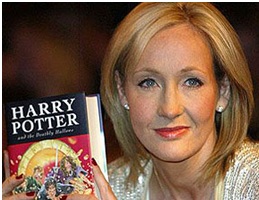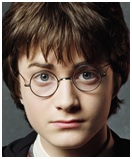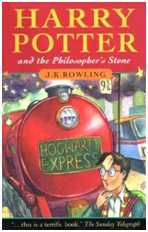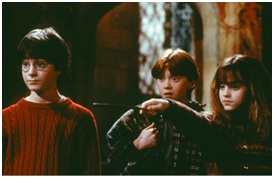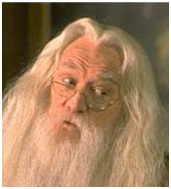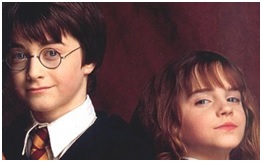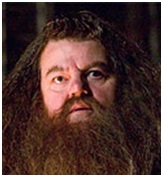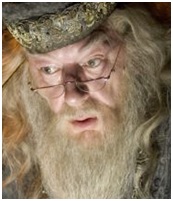|
 |
|
 |
|
|
||
Harry Potter and the Philosopher’s Stone - Success and
Ethics
Harry Potter and the Philosopher’s Stone (1997)
Written by the Englishwoman.J. K. (Joanne Kathleen) Rowling (1965- ), pictured right. In America the book was called Harry Potter and the Sorcerer’s Stone.
Fun facts
Key characters Harry Potter, young boy and hero. Hermione Granger and Ron Weasley, his best friends. Hagrid, giant groundkeeper at Hogwarts, a school of wizardry. (Albert) Dumbledore, the head of Hogwarts. Professor McGonagall, head of Gryffindor house. Professor Snape, head of Slytherin house. Professor Quirrell, teacher at Hogwarts. Voldemort, an evil wizard and Harry’s arch enemy.
Key terms Muggle, ordinary person without innate magical powers (like Hermione) Centaur, half-man (from the waist up), half-horse Troll, a twelve foot mountain creature Quidditch, an aerial ball game on flying broomsticks.
The story Dumbledore, Hagrid and Professor McGonagall from
Hogwarts School leave a note for the baby Harry Potter (born in late July
1980) It tells him that he’s a great wizard and that Voldemort killed his parents on Halloween 1981, and tried to kill Harry, leaving him with a lightning scar on his forehead. His horrible new parents (Aunt Petunia and Uncle Vernon) never give him the note. At midnight on his eleventh birthday, Hagrid arrives with an admissions letter for Hogwarts and takes him to London, stopping for school supplies in the wizards’ high street in London, Diagon Alley. Harry discovers he is famous and wealthy (after visiting the wizards’ bank, Gringotts). Hagrid buys him an owl (Hedwig) for his birthday. A month later he catches the train for Hogwarts at Kings Cross station in London on
platform 9¾ .He befriends two other first year students:
They (pictured right in the 2001 film) are delighted when they join Gryffindor house (headed by Professor McGonagall). Evil Professor Snape’s Slythrin house has the arrogant bully, Draco Malfoy (who becomes Harry’s enemy). Harry discovers a fierce three headed dog guarding a trapdoor in the forbidden third floor corridor. Then on Halloween he and Ron rescue Hermione, trapped in the girl’s toilet with a frightening troll. During Harry’s first Quidditch match, his broomstick suddenly goes out of control. Hermione magically sets fire to Snape’s coat after seeing him mutter a curse in Harry’s direction (although actually he is counteracting another teacher, Professor Quirrell’s evil spell). Harry regains control of his broomstick and brilliantly wins the match. Harry receives his father’s invisibility cloak for Christmas, using it to explore Hogwarts late at night. He discovers the Mirror of Erised which shows the viewer’s deepest desire. He sees his parents alive. Harry, Ron and Hermione learn that the three headed dog is guarding the Philosopher’s Stone which:
As part of their punishment for helping Hagrid get rid of an illegal dragon, Harry, Ron and
Hermione have to go into the enchanted forest to investigate some recent killings of
unicorns. There Harry sees a hooded man drinking unicorn blood who tries to attack him. He is rescued by
Firenze, a centaur, who tells him that his attacker was Voldemort. Harry decides he must find the Philosopher’s Stone before Voldemort after he discovers that he is trying to steal it. He, Ron and Hermione get past the three headed guard dog and win a life threatening chess game. Harry eventually finds Quirrell who says he must die. An angry voice demands to speak to Harry. It is Voldemort, whose face is revealed on the back of Quirrell’s head. Voldemort, living in Quirrell’s body, tells him to kill Harry, but Quirrell is burned on contact with him. A fight follows and Harry passes out. When Harry regains consciousness three days later, Dumbledore tells Harry that Quirrell and Voldemort couldn’t touch him, because of his scar, the result of his mother’s sacrificial love. The Philosopher’s Stone has been destroyed, so that it cannot be used for evil. Harry, Ron and Hermione’s bravery against Voldemort helps Gryffindor win the House Cup.
Lessons for success and ethics 1. Make the most of your potential Harry (pictured right with Ron and Hermione) transforms himself into a hero through:
2. Do good and defeat evil Harry is determined to emulate his good parents and destroy their evil killer, Voldemort. He has great courage and humility, despite his wealth and fame. Dumbledore tells him that self-discipline (see point 3) and morality are vital to success. “It is our choices, Harry, that show what we really are, far more than our abilities”, Dumbledore advises in the Chamber of Secrets, the second Harry Potter book. 3. Control your desires Dumbledore advises Harry not to look into the Mirror of Erised (desire backwards) to avoid being obsessed with his desires. Voldemort cannot love because his soul is so consumed by the desire for power.
4. All you need is love Harry is helped enormously by his friends at Hogwarts, and the Mirror of Erised shows how much he loves his dead parents . Love overcomes evil - Harry’s scar (resulting from his mother’s love) helps to defeat Quirrell and Voldemort. “If there is one thing that Voldemort cannot understand, it is love”, says Dumbledore.
5. Teamwork is vital Harry couldn’t have defeated Voldemort without Ron and Hermione’s help, particularly in the chess game. 6. With power comes responsibility Dumbledore (Richard Harris, pictured right in the film):
But Voldemort and Quirrell also show that power can be used for evil. “There is no good and evil, there is only power and those too weak to seek it”, Professor Quirrell says
7. Be tough but tender Dumbledore is a tough enforcer of the rules at Hogwarts. But (like Professor McGonagall and Hagrid) he is also:
8. Never stop learning Hermione (Emma Watson, pictured right below with Harry) improves more than anybody else, transforming herself from a goody-goody show-off into a likeable and loyal friend to Harry and Ron. She learns that:
Harry is also constantly learning from:
9. Accept what you can’t change and change what you can Harry:
Dumbledore says:
10. You can’t trust everybody Hagrid (Robbie Coltrane, pictured right in the film) believes that everybody is good and can be trusted. So he tells the villains about the three headed guard dog.
Dumbledore's best quotes (from all the books)
Dumbledore on success You fail to recognize that it matters not what someone is born, but what they grow to be!, Goblet of Fire (Michael Gambon, pictured right in the film) Dark times lie ahead of us and there will be a time when we must choose between what is easy and what is right, Goblet of Fire It does not do to dwell on dreams and forget to live, Philosopher's Stone
Dumbledore on fear Fear of a name increases fear of the thing itself, Philosopher's Stone
Dumbledore on change Understanding is the first step to acceptance, and only with acceptance can there be recovery, Goblet of Fire
Dumbledore on relationships Indifference and neglect often do much more damage than outright dislike, Order of the Phoenix
Dumbledore on love Do not pity the dead, Harry. Pity the living and, above all, those who live
without love, Deathly Hallows
Dumbledore on motivation Differences of habit and language are nothing at all if our aims are identical and our hearts are open, Goblet of Fire
Dumbledore on leadership It is a curious thing, but perhaps those who are best suited to power are those who have never sought it. Those who have leadership thrust upon them, and take up the mantle because they must, and find to their own surprise that they wear it well, Deathly Hallows Have you any idea how much tyrants fear the people they oppress?, Half-Blood Prince
Dumbledore on ethics It was important... to fight and fight again, and keep fighting, for only then can evil be kept at bay though never quite eradicated, Half-Blood Prince It is our choices, Harry, that show what we truly are, far more than our abilities, Chamber Of Secrets The truth is generally preferable to lies, Goblet of Fire The truth. It is a beautiful and terrible thing and therefore should be treated with great caution, Philosopher's Stone
Dumbledore on planning The consequences of our actions are always so complicated, so diverse, that predicting the future is a very difficult business indeed, Prisoner of Azkaban
Dumbledore on age Age is foolish and forgetful when it underestimates youth, Half-Blood Prince Old men are guilty if they forget what it was to be young, Order of the Phoenix
Dumbledore on happiness Happiness can be found even in the darkest of times, if one only remembers to turn on the light, Prisoner of Azkaban Humans do have a knack for choosing precisely those things which are worst for them, Philosopher's Stone
Dumbledore on death After all, to the well organized mind, death is but the next great adventure, Philsopher's Stone You think the dead we love ever truly leave us? You think that we don't recall them more clearly than ever in times of great trouble?, Prisoner of Azkaban It’s the unknown we fear when we look upon death and darkness, nothing more, Half-Blood Prince
Dumbledore on creativity Curiosity is not a sin.... But we should exercise caution with our curiosity, Goblet of Fire
Two literature websites to recommend 1. sparknotes.com 2. litcharts.com
|
|
|
||
|
|
||
| Copyright © wisdomtowin.com 2025 All Rights Reserved | ||
|


